-
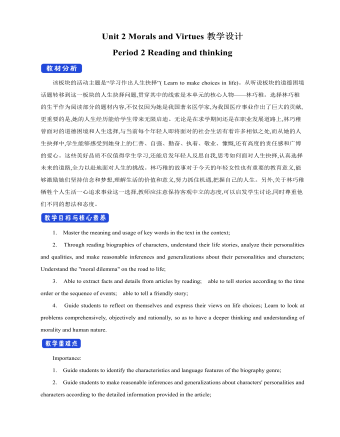
新人教版高中英语必修3Unit 2 Morals and Virtues教学设计二
Activity 41. Students complete the task of activity 4, then teachers and students check the answers. 2. The teacher organized the students to work together and asked them to use the tables and mind maps sorted out before to retold the important choices in Lin Qiaozhi's life and their resultsStep 5 Language points1. The teacher asks the students to read the text carefully, find out the core words and long and difficult sentences in the text and draw lines, understand the use of vocabulary, and analyze the structure of long and difficult sentences. 2. The teacher explains and summarizes the usage of core vocabulary and asks the students to take notes. 3. The teacher analyzes and explains the long and difficult sentences that the students don't understand, so that the students can understand them better. Step 6 Homework1. Read the text again, in-depth understanding of the text; 2. Master the use of core vocabulary and understand the long and difficult sentences. 3. Complete relevant exercises in the guide plan. 1、通过本节内容学习,学生是否理解和掌握阅读文本中的新词汇的意义与用法;2、通过本节内容学习,学生能否结合文本特点总结林巧稚的人生原则和人格品质特征;3、通过本节内容学习,学生能否针对人生抉择发表自己的看法;能否全面地、客观地、理性地看待问题,进而对道德和人性有更加深入的思考和理解。
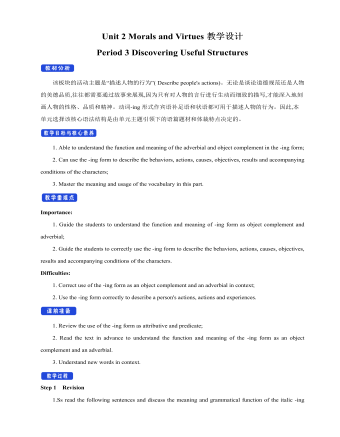
新人教版高中英语必修3Unit 2 Morals and Virtues教学设计三
The joke set her crying.这个玩笑使她哭起来。Step 5 ReadingActivity 31. Students read the small text in activity 3. The teacher provides several small questions to check whether students understand the content of the text and the ideographic function of the -ing form in the text.*Where are those people?*Why did Dr Bethune come to China?*How did he help the Chinese people during the war?*What did Chairman Mao Zedong say about him?2. Ss try to rewrite some sentences using the -ing form. Then check the answers. When checking the answers, the teacher can ask different students to read the rewritten sentences and give comments.Answers:1. he became very interested in medicine, deciding to become a doctor.2. …after hearing that many people were dying in the war.3. Helping to organise hospitals, he taught doctors and nurses, and showed people how to give first aid./ He helped to organise hospitals, teaching doctors and nurses, and showing people how to give first aid.4. …praising Dr Bethune as a hero to be remembered in China.Step 6 PracticeActivity 4Students complete grammar activities 2 and 3 on page 69 of the workbook.Step 6 Homework1. Understand and master the functions and usage of the -ing form;2. Finish the other exercises in Using structures.1、通过本节内容学习,学生是否理解和掌握动词-ing形式作宾语补足语语和状语语的功能和意义;2、通过本节内容学习,学生能否正确使用动词-ing形式描述人物的行为、动作及其经历;3、通过本节内容学习,学生能否独立完成练习册和导学案中的相关练习。
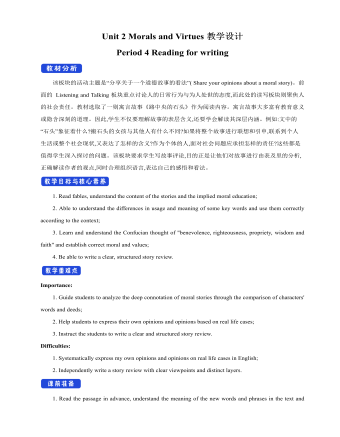
新人教版高中英语必修3Unit 2 Morals and Virtues教学设计四
3.Teachers ask different groups to report the answers to the questions and ask them to try different sentence patterns.The teacher added some sentence patterns for students to refer to when writing.Step 4 Writing taskActivity 51.Write the first draft.Students first review the evaluation criteria in activity 5, and then independently complete the draft according to the outline of activity 4, the answers to the questions listed in the group discussion and report, and the reference sentence pattern.2.Change partners.The teacher guides the students to evaluate their partner's composition according to the checklist of activity 5 and proposes Suggestions for modification.3.Finalize the draft.Based on the peer evaluation, students revise their own compositions and determine the final draft.Finally, through group recommendation, the teacher selects excellent compositions for projection display or reading aloud in class, and gives comments and Suggestions.Step 5 Showing writingActivity 5T call some Ss to share their writing.Step 6 Homework1. Read the passage in this section to better understand the passage.2. Carefully understand the hierarchical structure of the article, and deeply understand the plot of the story according to the causes, process and results;3. Independently complete the relevant exercises in the guide plan.1、通过本节内容学习,学生是否理解和掌握阅读文本中的新词汇的意义与用法;2、通过本节内容学习,学生能否通过人物言行的对比分析道德故事的深层内涵;3、通过本节内容学习,学生能否根据故事的起因、经过和结果来深入理解故事的情节,从而了解文章的层次结构;4、结合现实生活案例发表自己的见解和看法,写一篇观点明确、层次分明的故事评论。
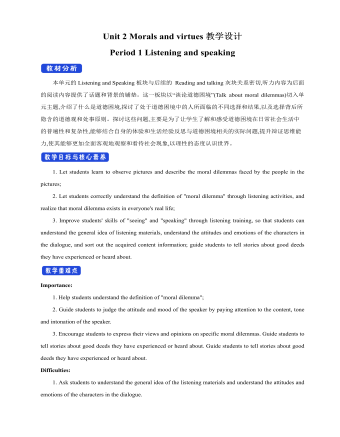
新人教版高中英语必修3Unit 2 Morals and virtues教学设计一
(2) students are divided into groups according to the requirements of activity 3. Each student shares a story of personal experience or hearing-witnessing kindness, and then selects the most touching story in the group and shares it with the whole class. Before the students share the story, the teacher can instruct them to use the words and sentence patterns in the box to express. For example, the words in the box can be classified:Time order: first of all, then, after that, later, finally logical relationship :so, however, although, butTeachers can also appropriately add some transitional language to enrich students' expression:Afterwards, afterwards, at last, in the end, eventuallySpatial order: next to, far from, on the left, in front ofOtherwise, nevertheless, as a result, therefore, furthermore, in addition, as well asSummary: in a word, in short, on the whole, to sum up, in briefStep 8 Homework1. Understand the definition of "moral dilemma" and establish a correct moral view;2. Accumulate vocabulary about attitudes and emotions in listening texts and use them to express your own views;3. Complete relevant exercises in the guide plan.1、通过本节内容学习,学生能否理解理解“道德困境”的定义;2、通过本节内容学习,学生能否通过说话人所表达的内容、说话的语气、语调等来判断其态度和情绪;3、通过本节内容学习,学生能否针对具体的道德困境发表自己的看法和见解,能否掌握听力理训练中的听力策略。
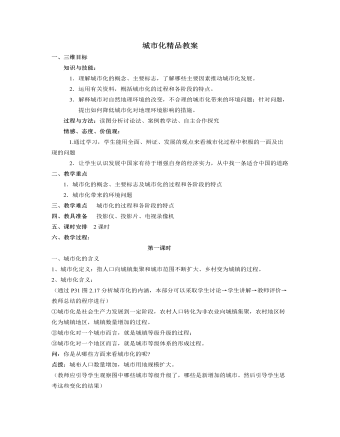
人教版高中地理必修2城市化精品教案
1.改善城市环境:治理河流、控制大气污染物、大力加强绿化建设为改善城市环境,上海市全面展开对大气、河流、噪声等多方面的治理工作。如苏州河的治理、降低城市污染物浓度、加强绿化建设,截止1990年,市区绿化覆盖率达到20.3%。2.改善城市交通、改善居住条件扩宽主干道,修建环城公路,修筑了南浦大桥和扬浦大桥,新修城市高架公路和地铁,改造住宅。3.控制城市规模建立卫星城,开发新区,有效地控制城市中心区的规模。思考:什么时候许多国家采取措施保护和改善城市环境?你认为可以采取哪些措施来保护和改善城市环境?上海市保护和改善城市环境的措施:上海的卫星城有哪些?上海新建了哪个新区?目前浦东新区在上海的地位如何?建立卫星城和开发新区可以起到什么作用?上海市为改善交通条件,做了哪些工作?
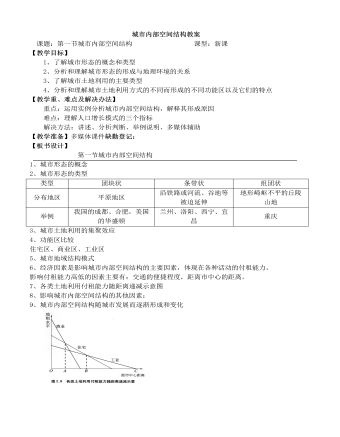
人教版高中地理必修2城市内部空间结构教案
过渡:在实际生活中,城市内部空间结构并非完全按照这一经济规律呈现,而是更具复杂性。这说明除了经济因素外,还有很多其他因素在起作用,请大家结合你的认识、图2.9和案例1:纽约市的少数民族区谈谈你的看法。(2)其他因素I收入——形成不同级别住宅区的常见原因。有能力支付昂贵租金和选择最佳居住环境的人,其居住地往往形成高级住宅区。II知名度——城市内某些地区在历史、文化或经济方面具有很高的声誉,这往往会吸引更多新的住宅或商场建在该处,以提高其知名度。III种族聚居区的形成——在有些城市的某一区域内,如果某个种族或宗教团体占优势,就可能形成种族聚居区。如纽约市的唐人街、哈林区、小意大利区等。IV历史因素——城市的建筑物和街道设计可以维持久远,早期的土地利用方式对日后的功能分区有着深远的影响。
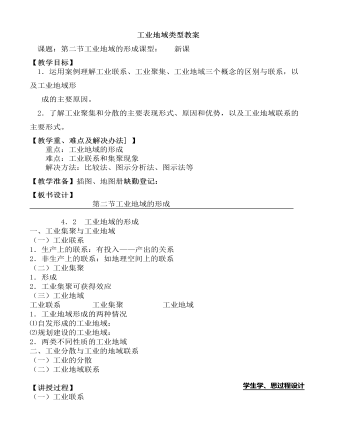
人教版高中地理必修2工业地域类型教案
1.生产上的联系:有投入——产出的关系工业生产的过程复杂,工序繁多,往往需要经过多家工厂的加工才能完成一种产品的生产过程。因此,在这些工厂之间就存在着产品与原料的联系。一家工厂生产的产品是另一家工厂的原料,这两家工厂之间就形成了工序上的工业联系。2.非生产上的联系:如地理空间上的联系布局在同一个工业区内,共同利用工业区的道路、供水、供电、通信等基础设施以及其他生产、生活服务设施,或者共同利用当地廉价的劳动力,形成了空间利用上的工业联系。我国许多地方的经济技术开发区就是建立在这种工业联系基础上的。(二)工业集聚1.形成具有工业联系的一些工厂往往近距离地聚集起来,形成工业集聚现象。2.工业集聚可获得效应(1)工业集聚可以加强企业间的信息交流和技术协作,降低中间产品的运输费用和能源消耗,进而降低生产成本,提高生产效率和利润,取得规模效益。
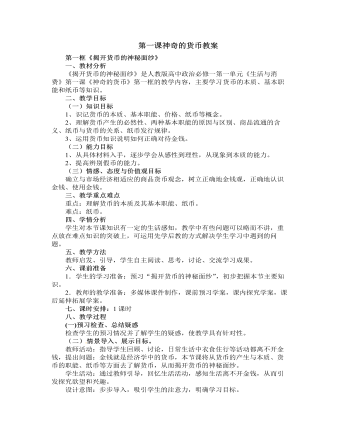
人教版高中政治必修1第一课神奇的货币教案
1、外汇与外币的关系:(1)外汇包括外币,但外汇不等于就是外币。外币是指外国的货币,包括外国的纸币、铸币;外汇通常是以外国货币表示的用于国际间结算的支付手段,具体包括外币、外币有价证券、外币支付凭证等。(2)外币属于外汇的范围,但不能把二者等同起来。通常情况下,只有可以自由兑换的外币才是外汇,因为外汇的实质是国际支付手段,如果某种货币不能自由兑换,它就不能成为国际支付手段。外汇执行的 主要是货币的支付手段的职能。(3)持有外汇意味着对外汇发行国拥有债权。持有外汇过多,一方面意味着国际支付能力强和有可能对外汇发行国施加影响;另一方面则意味着大量该由本国享受的资源,被借给外国利用,并要承担外汇贬值的风险。2、关于币值变化的分析:(1)对货币升值的具体分析:一个国家的货币升值(上浮)后,同量的这种货币能比以前换 取更多的他国货币,买到更多的他国商品。
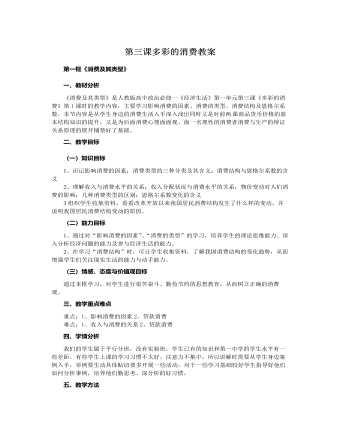
人教版高中政治必修1第三课多彩的消费教案
二、做理智的消费者1、量入为出,适度消费2、避免盲从,理性消费3、保护环境,绿色消费4、勤俭节约,艰苦奋斗十、教学反思本课的设计采用了课前下发预习学案,学生预习本节内容,找出自己迷惑的地方。课堂上师生主要解决重点、难点、疑点、考点、探究点以及学生学习过程中易忘、易混点等,最后进行当堂检测,课后进行延伸拓展,以达到提高课堂效率的目的。这节课我们主要学习了影响人们消费的几种消费心理和几种科学的消费观。本节课与学生生活十分贴近所以这节课充分的调动了学生学习的兴趣和积极性,并且让学生针对案例进行充分的分组讨论分析,通过学生的展示分析和补充可以知道学生们不但深层次分析了教学原理也透彻理解了教学重难点大大提高了课堂效率.。通过案例的分析进一步领会了教材原理突破了本节课的难点——树立正确的消费观。整堂课学生求知旺盛,复杂的知识变得简单化,从阅读教材到独立思考分析再到合作讨论最后的展示质疑答疑,加深了印象,提高了能力。
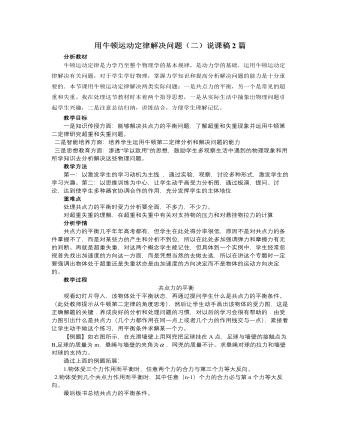
人教版新课标高中物理必修1用牛顿运动定律解决问题(二)说课稿2篇
教师活动:(1)组织学生回答相关结论,小组之间互相补充评价完善。教师进一步概括总结。(2)对学生的结论予以肯定并表扬优秀的小组,对不理想的小组予以鼓励。(3)多媒体投放板书二:超重现象:物体对支持物的压力(或对悬挂物的拉力)大于物体所受到的重力的情况称为超重现象。实质:加速度方向向上。失重现象:物体对支持物的压力(或对悬挂物的拉力)小于物体所受到的重力的情况称为失重现象。实质:加速度方向向下。(4)运用多媒体展示电梯中的现象,引导学生在感性认识的基础上进一步领会基本概念。4.实例应用,结论拓展:教师活动:展示太空舱中宇航员的真实生活,引导学生应用本节所学知识予以解答。学生活动:小组讨论后形成共识。教师活动:(1)引导学生分小组回答相关问题,小组间互相完善补充,教师加以规范。(2)指定学生完成导学案中“思考与讨论二”的两个问题。
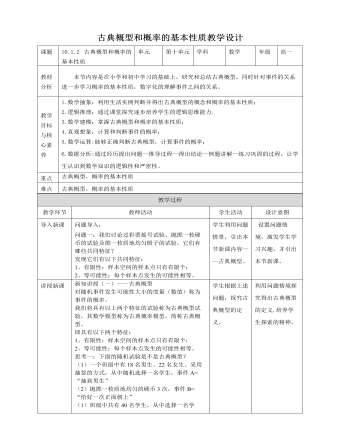
人教A版高中数学必修二古典概型和概率的基本性质教学设计
新知讲授(一)——古典概型 对随机事件发生可能性大小的度量(数值)称为事件的概率。我们将具有以上两个特征的试验称为古典概型试验,其数学模型称为古典概率模型,简称古典概型。即具有以下两个特征:1、有限性:样本空间的样本点只有有限个;2、等可能性:每个样本点发生的可能性相等。思考一:下面的随机试验是不是古典概型?(1)一个班级中有18名男生、22名女生。采用抽签的方式,从中随机选择一名学生,事件A=“抽到男生”(2)抛掷一枚质地均匀的硬币3次,事件B=“恰好一次正面朝上”(1)班级中共有40名学生,从中选择一名学生,即样本点是有限个;因为是随机选取的,所以选到每个学生的可能性都相等,因此这是一个古典概型。
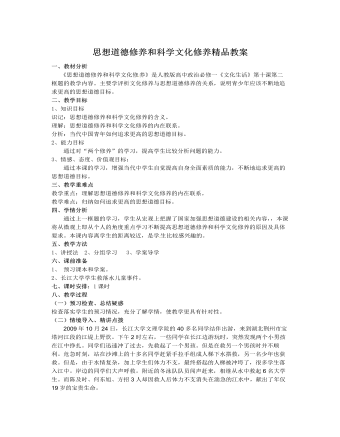
人教版高中政治必修3思想道德修养和科学文化修养精品教案
一、教材分析《思想道德修养和科学文化修 养》是人教版高中政治必修一《文化生活》第十课第二框题的教学内容。主要学评析文化修养与思想道德修养的关系,说明青少年应该不断地追求更高的思想道德目标。二、教学目标1、知识目标识记:思想道德修养和科学文化修养的含义。理解:思想道德修养和科学文化修养的内在联系。分析:当代中国青年如何追求更高的思想道德目标。2、能力目标通过对“两个修养”的学习,提高学生比较分析问题的能力。3、情感、态度、价值观目标:通过本课的学习,增强当代中学生自觉提高自身全面素质的能力,不断地追求更高的思想道德目标。三、教学重难点教学重点:理解思想道德修养和科学文化修养的内在联系。教学难点:归纳如何追求更高的思想道德目标。四、学情分析通过上一框题的学习,学生从宏观上把握了国家加强思想道德建设的相关内容,,本课将从微观上即从个人的角度重点学习不断提高思想道德修养和科学文化修养的原因及具体要求。本课内容离学生的距离较近,是学 生比较感兴趣的。
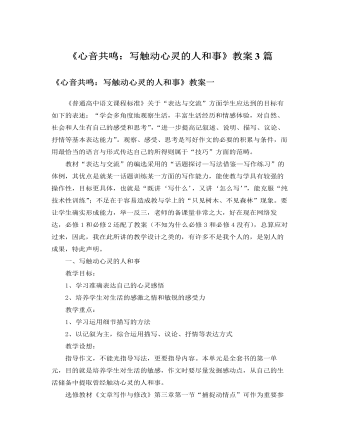
人教版高中语文必修1《心音共鸣:写触动心灵的人和事》教案3篇
《普通高中语文课程标准》关于“表达与交流”方面学生应达到的目标有如下的表述:“学会多角度地观察生活,丰富生活经历和情感体验,对自然、社会和人生有自己的感受和思考”,“进一步提高记叙述、说明、描写、议论、抒情等基本表达能力”。观察、感受、思考是写好作文的必要的积累与条件,而用最恰当的语言与形式传达自己的所得则属于“技巧”方面的范畴。教材“表达与交流”的编选采用的“话题探讨—写法借鉴—写作练习”的体例,其优点是就某一话题训练某一方面的写作能力,能使教与学具有较强的操作性,目标更具体,也就是“既讲‘写什么’,又讲‘怎么写’”,能克服“纯技术性训练”;不足在于容易造成教与学上的“只见树木、不见森林”现象。要让学生确实形成能力,举一反三,老师的备课量非常之大,好在现在网络发达,必修1和必修2还配了教案(不知为什么必修3和必修4没有),总算应对过来,因此,我在此所讲的教学设计之类的,有许多不是我个人的,是别人的成果,特此声明。
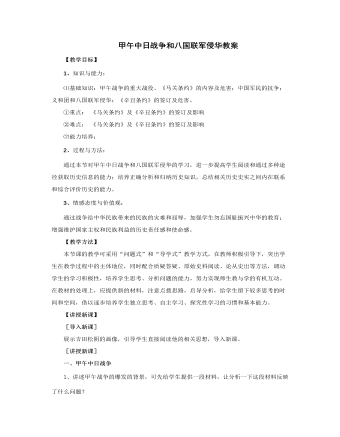
人教版高中历史必修1甲午中日战争和八国联军侵华教案
(1)巨额的赔款,是列强对中国空前的大规模勒索;为支付这笔巨额赔款,清政府加紧搜刮人民,使人民生活更加贫困,社会经济更加凋敝。(2)在北京设立的“使馆界”,实际上是“国中之国”,是帝国主义策划侵略中国的大本营。外国侵略者控制京津地区,使清政府完全处于外国军队的控制之下,便于侵略者直接派兵镇压中国人民的反帝斗争。(3)按照条约规定,清朝官吏严厉镇压中国人民的反帝斗争,进一步成为帝国主义的帮凶。(4)改设外务部的规定,便于清政府能够按照外国侵略者的意旨实行卖国的外交政策。《辛丑条约》是帝国主义强加给中国的一个严重的不平等条约,列强除了穷凶极恶地对中国敲诈勒索外,还重新确立了以慈禧太后为首的清政府继续充当它们在华的代理人。
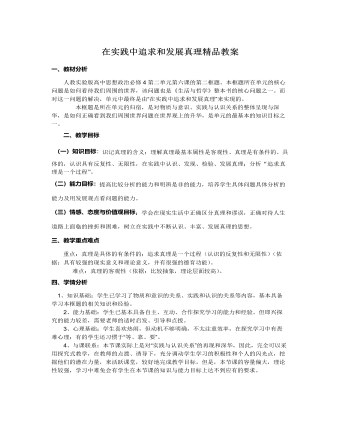
人教版高中政治必修4在实践中追求和发展真理精品教案
一、教材分析人教实验版高中思想政治必修4第二单元第六课的第二框题。本框题所在单元的核心问题是如何看待我们周围的世界,该问题也是《生活与哲学》整本书的核心问题之一。而对这一问题的解决,单元中最终是由“在实践中追求和发展真理”来实现的。 本框题是所在单元的归宿,是对物质与意识、实践与认识关系的整体呈现与深华,是如何正确看到我们周围世界问题在世界观上的升华,是单元的最基本的知识目标之一。 二、教学目标(一)知识目标:识记真理的含义;理解真理最基本属性是客观性、真理是有条件的、具体的,认识具有反复性、无限性,在实践中认识、发现、检验、发展真理;分析“追求 真理是一个过程”。(二)能力目标:提高比较分析的能力和明辨是非的能力,培养学生具体问题具体分析的能力及用发展观点看问题的能力。(三)情感、态度与价值观目标:学会在现实生活中正确区分真理和谬误,正确对待人生道路上面临的挫折和困难,树立在实践中不断认识、丰富、发展真理的思想。
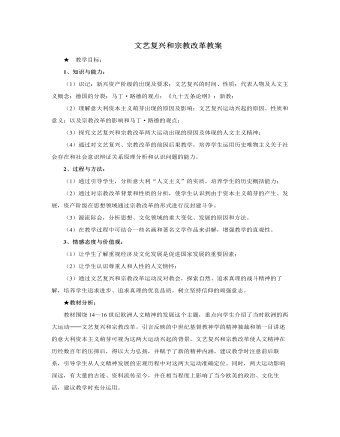
人教版高中历史必修3文艺复兴和宗教改革教案
三、宗教改革:1、背景:(1)文艺复兴的影响。文艺复兴中,人文主义学者尽管对宗教保持较为温和的态度,但其以人为中心的思想极大地冲击了天主教的精神独裁,天主教的权威日益受到人们的怀疑。(2)天主教会对欧洲尤其是德意志的压榨。中世纪的天主教会对人民进行严密的精神统治,基督教信仰的核心是“原罪”和“灵魂救赎”,即人生下来就有罪,只有信仰上帝,跟随耶稣才能得救。就“灵魂救赎”而言,最初强调的是个人信仰的作用,后来,神学家们又加上了种种繁杂的宗教礼仪,而且必须得到神职人员的帮助,灵魂才能得救。在经济上,天主教会还是最大的封建主,占有大量的土地,并征收什一税,对各国人民大肆搜刮。罗马教廷每年从德意志搜刮的财富达30万古尔登(货币单位),相当于“神圣罗马帝国”皇帝每年税收额的20倍。德意志也成了被教会榨取最严重的地区,素有“教皇的乳牛”之称。
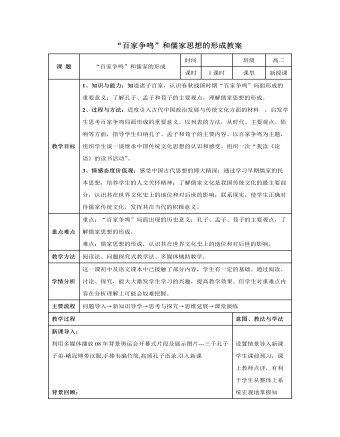
人教版高中历史必修3“百家争鸣”和儒家思想的形成教案
1、知识与能力:知道诸子百家,认识春秋战国时期“百家争鸣”局面形成的重要意义;了解孔子、孟子和荀子的主要观点,理解儒家思想的形成。2、过程与方法:适度引入古代中国政治发展与传统文化方面的材料 ,启发学生思考百家争鸣局面形成的重要意义。以列表的方法,从时代、主要观点、影响等方面,指导学生归纳孔子、孟子和荀子的主要内容。以百家争鸣为主题,组织学生谈一谈继承中国传统文化思想的认识和感受。组织一次“我读《论语》的读书活动”。3、情感态度价值观:感受中国古代思想的博大精深:通过学习早期儒家的民本思想,培养学生的人文关怀精神;了解儒家文化是我国传统文化的最主要部分,认识其在世界文化史上的地位和对后世的影响;联系现实,使学生正确对待儒家传统文化,发挥其在当代的积极意义。
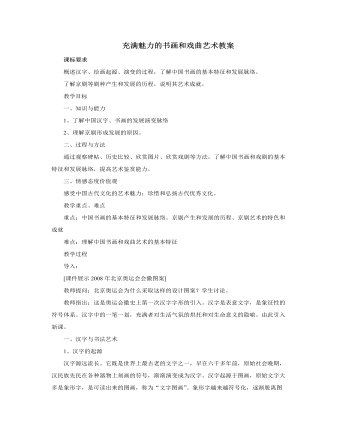
人教版高中历史必修3充满魅力的书画和戏曲艺术教案
乾隆五十五年(公元1790年),在安徽一带很有名气的“三庆”徽戏班,来到北京演出。徽戏在北京经常和其他剧种同台演出,注意吸收和借鉴他们的长处。尤其是与以唱二黄调和西皮调为主的汉戏的合演,逐渐形成了二黄与西皮的合流,形成了“徽汉合流”的局面,后来徽剧又吸收其他民间曲调的唱腔、剧目和表演方式,逐渐形成以“皮黄”为主要声腔的京剧。到1840年左右,京剧的唱腔、念白、剧本和表演已经成熟,尤其是出现了以演“京戏”为主的一批演员,他们不再以徽戏、汉戏为名,而以演“京戏”自居。从此,诞生了一个独立的剧种──京剧。2、京剧的发展早期的京剧以迷人的唱腔、丰富的剧目、精彩的表演和京腔京味吸引了观众,使京城出现了京剧热。同治、光绪年间,京剧已经被京城市民承认,成为人们最喜爱的舞台艺术。并涌现出著名的“同光十三绝”。
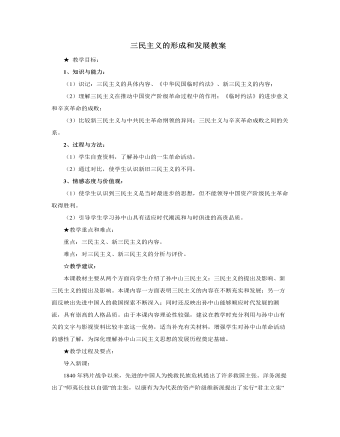
人教版高中历史必修3三民主义的形成和发展教案
局限性:新三民主义在理论上、纲领上仍然没有超出资产阶级民主主义的范畴。且与中共民主革命纲领有着原则的区别。与中共革命纲领相比,新三民主义缺少的内容:八小时工作制、彻底实现人民的权利、社会主义。教学小结:(以问题代小结)(1)本课内容涉及孙中山先生一生两次重要的转变。你知道是哪两次吗?在学生讨论的基础上,教师总结:孙中山先生一生有两次重要的转变,第一次是放弃改良而走向革命道路;第二次是在他领导的一系列资产阶级革命活动失败后,接受苏俄和中共的帮助,把旧三民主义发展成为新三民主义,实行“联俄、联共、扶助农工”三大政策,实现了他一生中最伟大的转变。(2)孙中山先生的这两次转变说明了什么?这一问题可以让学生各抒己见,但教师总结时一定要紧扣孙中山先生与时俱进,为民族革命贡献毕生精力的高贵品质。
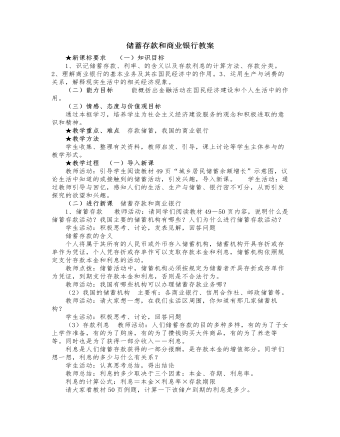
人教版高中政治必修1储蓄存款和商业银行教案
第三、结算业务结算业务时商业银行为社会经济活动中的货币收支提供手段与工具的服务。银行从中收取一定的服务费用。除上述三大业务外,商业银行还可以提供债券买卖与兑付、代理买卖外汇、代理保险、提供保管箱等其他服务。教师活动:商业银行在我国经济建设中具有巨大作用。请同学们看教材52页专家点评。学生活动:阅读课本,认真总结,得出结论(三)课堂总结、点评 这节课我们重点学习了储蓄存款和商业银行的有关知识,知道了储蓄存款活动程序、主要机构、特点和利息的计算等常识,了解了各种商业银行主要业务及其作用。这对于我们在日常生活中正确地办理金融储蓄业务将有重大指导作用。★课余作业 组织学生到附近银行、企业、居民中,咨询银行信贷活动的程序及原则要求,并亲自到商业银行办理一次存款和取款活动。





















